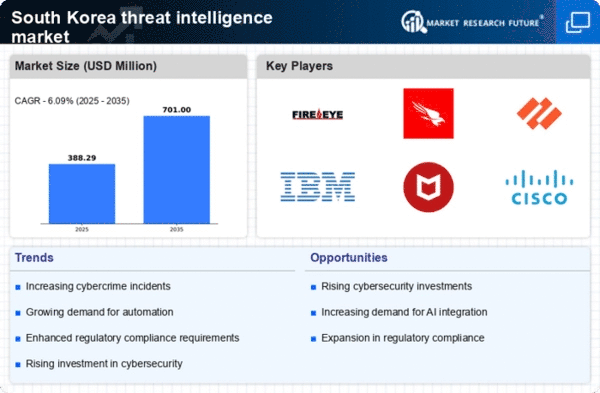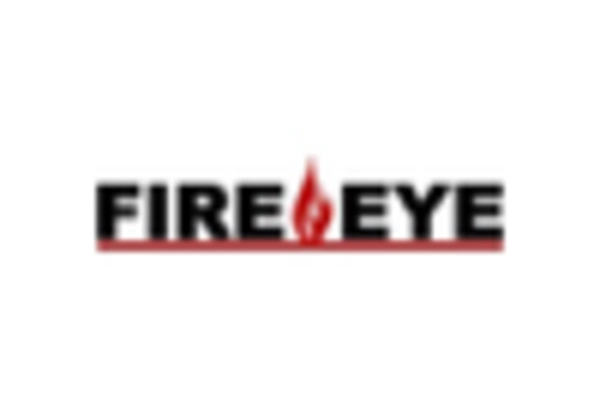Increasing Cyber Threats
The escalation of cyber threats in South Korea has become a pivotal driver for the threat intelligence market. With the rise in sophisticated cyber attacks, organizations are compelled to invest in advanced threat intelligence solutions. Reports indicate that the number of reported cyber incidents has surged by over 30% in the past year alone. This alarming trend necessitates a proactive approach to cybersecurity, prompting businesses to seek comprehensive threat intelligence services. The threat intelligence market is expected to grow significantly as companies prioritize the identification and mitigation of potential threats. As a result, the demand for real-time threat intelligence feeds and analytics tools is likely to increase, shaping the future landscape of the industry.
Regulatory Compliance Requirements
In South Korea, stringent regulatory compliance requirements are driving the demand for threat intelligence solutions. Organizations are increasingly required to adhere to various cybersecurity regulations, such as the Personal Information Protection Act (PIPA). Non-compliance can result in hefty fines and reputational damage, which has led many companies to invest in threat intelligence services to ensure compliance. The threat intelligence market is witnessing a surge in demand as businesses seek to align their cybersecurity strategies with regulatory standards. It is estimated that compliance-related investments in cybersecurity will account for approximately 25% of total cybersecurity spending in the coming years. This trend underscores the critical role of threat intelligence in helping organizations navigate the complex regulatory landscape.
Growing Awareness of Cybersecurity Risks
The growing awareness of cybersecurity risks among South Korean businesses is significantly influencing the threat intelligence market. As organizations recognize the potential financial and operational impacts of cyber threats, there is a marked shift towards adopting proactive cybersecurity measures. Educational initiatives and high-profile cyber incidents have heightened awareness, leading to increased investments in threat intelligence solutions. Market analysts suggest that the threat intelligence market could expand by 20% annually as companies prioritize risk management and threat detection. This heightened awareness is fostering a culture of cybersecurity vigilance, compelling organizations to integrate threat intelligence into their overall security frameworks.
Collaboration Among Industry Stakeholders
Collaboration among industry stakeholders is emerging as a crucial driver for the threat intelligence market. In South Korea, partnerships between government agencies, private sector companies, and cybersecurity firms are fostering a more robust cybersecurity ecosystem. These collaborations facilitate the sharing of threat intelligence, best practices, and resources, enhancing the overall security posture of organizations. Initiatives such as public-private partnerships are becoming increasingly common, with the aim of creating a unified front against cyber threats. This collaborative approach is expected to accelerate the growth of the threat intelligence market, as organizations recognize the value of collective intelligence in combating cyber risks. The synergy created through these partnerships is likely to lead to more effective threat detection and response strategies.
Technological Advancements in Cybersecurity
Technological advancements are reshaping the threat intelligence market in South Korea. Innovations in artificial intelligence (AI) and machine learning (ML) are enhancing the capabilities of threat intelligence solutions, enabling organizations to analyze vast amounts of data more efficiently. These technologies allow for the identification of patterns and anomalies that may indicate potential threats. As a result, businesses are increasingly adopting AI-driven threat intelligence platforms to bolster their cybersecurity defenses. The market is projected to witness a compound annual growth rate (CAGR) of 15% over the next five years, driven by the integration of advanced technologies. This trend highlights the importance of staying ahead of evolving cyber threats through innovative solutions.
















